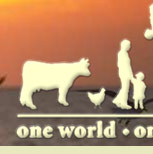15th November 2004,
Bangkok, Thailand
Conference Summary
Beyond Zoonoses: One World – One Health,
The Threat of Emerging Diseases to Human Security
and Conservation, and the Implications
for Public Policy
A one-day workshop prior to the World Conservation
Congress devoted to mapping out the links between animal health,
conservation and human security, and to identifying creative approaches
to protecting the health of people, animals, and ecosystems.
We are grateful to the Ministry of Public Health, Thailand for providing
a venue for this forum and for co-sponsoring this workshop organized
by the Wildlife Conservation Society, the IUCN Commission on Environmental
Law, the IUCN Veterinary Specialist Group, the IUCN Commission on
Environmental, Economic and Social Policy, the International Institute
for Sustainable Development, the Center for Environmental Legal
Studies of Pace University School of Law, and Asia - Pacific Centre
for Environmental Law at the National University of Singapore, and
the U.S. Centers for Disease Control.
"Monkey pox," "SARS," "Ebola" and
“avian influenza” are now household words. In Asia,
avian influenza has challenged food security and undermined economic
growth across the region. In the face of crises like these, many
untested and in some cases ill-conceived efforts to control the
spread of the disease have had severe negative impacts on and implications
for conservation, turning nature into a perceived threat to public
health. In a world where public health is an international security
concern, conservationists need to take a careful look at how people
and governments react to new and emerging disease outbreaks.
On the eve of the World Conservation Congress in Bangkok in 2004,
no conference on the health of global ecosystems can ignore an issue
so salient to the world and to Southeast Asia in particular. Can
IUCN encourage a more proactive and collaborative approach to zoonotic
disease than we have seen to date, one involving partnerships between
wildlife health professionals and other conservationists, domestic
animal health monitoring agencies, private industry, and the public
health sector?
A first step on that path, this workshop proposes through a review
of recent outbreaks of zoonotic disease and policy response to assess
where the priorities of conservation and public health conflict,
and where they align. More specifically, it will seek to:
1. Identify examples where sound conservation activities and policies
contribute to animal and human health at the local, regional and
global scales; and public health measures that unduly undermine
conservation efforts
2. Assess whether the public health imperative would be a credible
lever through which to mitigate international trade in wildlife,
something conservationists have largely failed to accomplish?
3. Determine next steps for strengthening the voice of animal health
and conservation biology experts in public health decision-making
4. Identify the legislation, regulation, agreements, or policies
needed to fill gaps in promoting health and conservation at a global
scale
This workshop will review situations from around Asia and elsewhere
where incursions into forests, dietary choices, an enormous trade
in wildlife involving markets densely packed with live animals from
around the globe, and other alterations of relationships between
humans, domestic animals and the natural world have altered the
ecology of pathogens and their potential hosts, sometimes with frightening
results.
Today, a localized disease outbreak can quickly spread globally,
and the economic impacts can undermine efforts to reduce poverty
and strengthen food security. We are in an era of "one health,"
and our global institutional arrangements urgently need to recognize
and address this reality. The purpose of this symposium is to take
a holistic and multidisciplinary look at the "missing links"
in terms of how the world is currently addressing new and emerging
zoonotic diseases in the context of public health and environmental
stewardship.
At the World Conservation Congress, we have an opportunity to reinforce
conservation's relevance and breadth of expertise on a global stage
by demonstrating the value of a "one health" approach
- in the interest of humanity, and the environment. |


